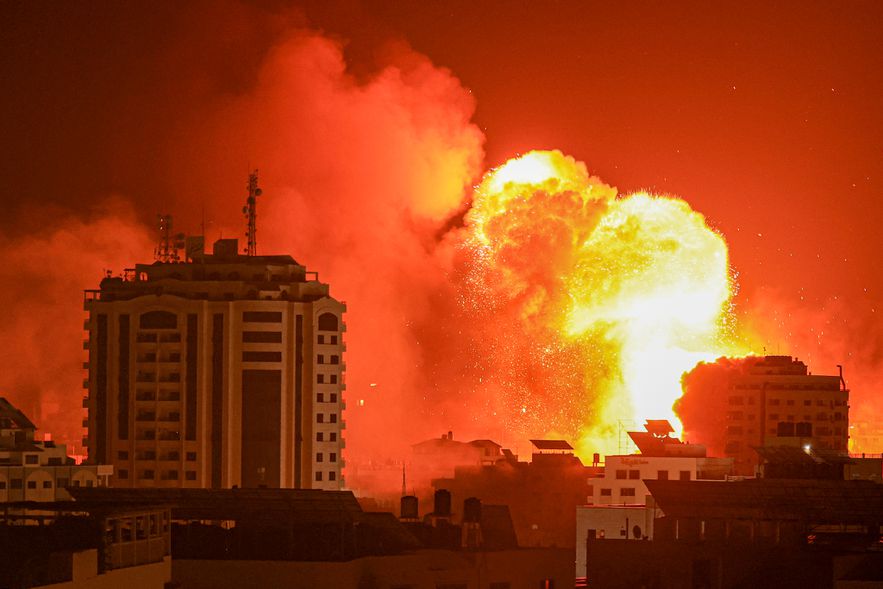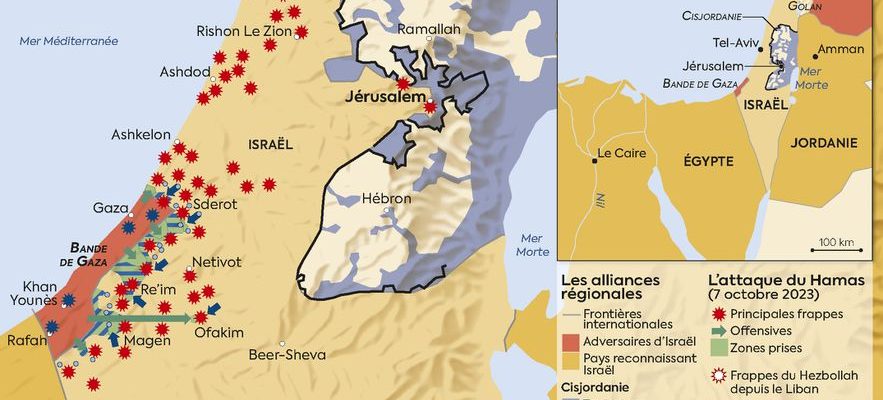At dawn on Saturday October 7, in the customary silence of the Negev desert, the crash of boots woke up a sleeping giant. Confident in its strength and sleeping heavily, Israel saw several thousand rockets launched from the Gaza Strip flood into its territory. That’s not all: armed fighters from the Palestinian Islamist movement Hamas then crossed the border, massacred hundreds of young people who were participating in a festival not far away, and captured dozens of hostages, civilians and soldiers. The terrorist attack turns into a real war in a few hours. The Jewish state is in shock. He promises a response commensurate with what he suffered. Since then, strikes have increased on both Israel and the Gaza Strip. Neither side seems ready to lay down their arms. And the human toll increases by the hour: more than 1,600 dead on both sides, most of them civilians. At the time when his government announced a “complete siege” of the Palestinian enclave, Benjamin Netanyahu appears very weakened in international opinion.
The historian, essayist and figure of the “peace camp” Elie Barnavi, who was Israeli ambassador to France between 2000 and 2002, believes that the head of the Israeli government has “formed the most extremist and incompetent coalition of the history of the country and has left the reins on the necks of the madmen of God, who are multiplying the attacks of force in the ‘Territories’ and the provocations on the Temple Mount”. Interview.
L’Express: How do you judge the Hamas attack against Israel? Were you surprised by the timing?
Elie Barnavi: Hamas attack is the most serious assault on the people of Israel, on its sovereign territory, since the war [israélo-arabe] of 1948. We often talk about the Yom Kippur War, fifty years ago. But, despite obvious points of convergence, we are in the presence of a different type of event, which in certain respects is more reminiscent of the terrorist attack of September 11, 2001 in the United States.
Why did it take place at that time? It’s hard to get into the heads of your planners. Let us say that four elements seem plausible: the deep political and moral crisis in Israel, which seemed in the eyes of Hamas to weaken its defense capabilities; the military’s emphasis on protecting West Bank settlements, which gave Hamas a propaganda advantage over the passivity of the Palestinian Authority, as well as a military advantage, given the depletion of troops on the edge of the Gaza Strip in favor of “Judea and Samaria” [NDLR : nom donné à la Cisjordanie par l’Etat d’Israël] ; a real possibility of “unification of the fronts” (Gaza, South Lebanon, West Bank and Jerusalem) under its aegis; and, perhaps above all, the threat, from his point of view, of a normalization of relations between Israel and Saudi Arabia to the detriment of Palestine and its Iranian sponsor.
Was it predictable?
It depends on what we mean by this term. In its terms, no; in principle, in other words, the probability that a large-scale explosion would occur at one time or another, certainly. Many of us in Israel said that the current situation could not last indefinitely, both in Gaza and the West Bank, and that it would blow up in our faces.
Israel appears to have been surprised by the scale of this attack. Can we say that the Israeli intelligence services, so renowned, have failed?
Yes, totally. This is a big difference from what happened before the Yom Kippur War. At the time, information existed, precise and abundant; the problem was their political treatment. On the eve of the Hamas attack on October 7, they were scattered and vague. The commission of inquiry which will undoubtedly be set up when the guns have fallen silent will have work to do. The latest news is that the head of Egyptian general intelligence, Abbas Kamel, informed Netanyahu ten days before the launch of the Hamas attack that the Islamist organization was preparing something large-scale. The Prime Minister would have turned a deaf ear. He denies. But if it came true, it would be a major scandal.
The Hamas attack and Israel’s response.
© / ART PRESS
As a figure in the “peace camp”, how did you experience this outburst of violence?
Badly, obviously. I was shocked like everyone else. Again, I was expecting something – eruptions of violence between Israel and Hamas are recurrent – but certainly not an attack of this magnitude or this explosion of raw savagery.
Should we expect a long war, as Benjamin Netanyahu declared? And, perhaps, a ground operation in Gaza?
I do not know how to measure the length of an operation which is in its initial phase and which, obviously, does not obey the episodes of violence to which we were accustomed. A few weeks ? Some months ? Everything will depend on the war goals defined by the government. If the IDF is content to break Hamas’ operational capabilities through airstrikes, even exceptionally harsh ones, that’s one thing; if he embarks on a major ground operation intended to put an end to Hamas, which is likely, that is another matter.
Do you think the Hamas offensive and the massacre and taking of civilians hostage mark a turning point in the history of this conflict?
Yes, without a doubt. Until now, the conflict obeyed a certain number of rules more or less respected by both sides. The massacre of civilians and the taking of hostages projected him into another dimension. The dominant discourse in Israel is that we must not return to the status quo that prevailed before. It is very possible that we are heading towards another situation in the Strip, without Hamas. We still need to know how we are going to manage the void afterwards. We would have to completely change the software: introduce international, Arab, American and European players into the game, and give a role again to the Palestinian Authority. But it is better not to have too many illusions.
What role did Iran play in this attack?
Iran played an essential role. In order to ensure its hegemony in the region, Iran’s interest is to torpedo a possible normalization agreement between Saudi Arabia – which remains its main rival, despite their recent reconciliation under the aegis of China – and Israel, and cause the conflagration of the Palestinian territories. Iran is the inspiration for the Shiite axis which runs from Tehran to Lebanon, via Iraq and Syria, the patron of Lebanese Hezbollah and the supplier of military equipment to Hamas and Palestinian Islamic Jihad. In recent events, the Revolutionary Guard Corps’ Quds Force has provided Hamas with weapons, training and logistical support. And it also carries out coordination work between the different organizations, notably Hamas and Hezbollah.
What will be the regional consequences of this attack? Can we fear an extension of the conflict?
Indeed. Hezbollah risks opening a second front in the North, and the West Bank is a powder keg. This would be the “unification of fronts” that I mentioned above. I don’t think Hezbollah really wants to go to war at the moment; the Lebanese situation is really not ideal for an adventure of this kind. But he risks finding himself drawn into it.
Is Benjamin Netanyahu also partly responsible? Is this a sign that his policy has failed?
He is eminently responsible. He formed the most extremist and incompetent coalition in the history of the country and left the reins on the necks of the madmen of God, who are increasing their attacks of force in the “Territories” and the provocations on the Temple Mount. By focusing exclusively on his personal fate as a defendant who risks prison, he has dragged the country into a terrible political and moral crisis with his justice reform, a judicial coup, in fact. In doing so, he knowingly undermined the country’s social cohesion and its defense capabilities. He systematically ignored the warnings of all established bodies, notably the military hierarchy. More generally, he continued the inept policy of favoring Hamas to the detriment of the Palestinian Authority, in order to better separate the Gaza Strip from the West Bank and thus definitively bury any possibility of creating a Palestinian state alongside the State of Israel.

Israeli strikes on Gaza, October 9, 2023.
© / afp.com/MAHMUD HAMS
What will this war cause in Israeli politics? An even higher notch in the hardening of relations between Palestinians and Israelis?
It is probable that after the first moment of unanimity desired by the situation, after also, perhaps, the episode of an ephemeral government of national unity, the latent civil war which we have been witnessing since the announcement of the judicial reform project, on January 4, will resume with a vengeance. Unless Netanyahu formally renounces his judicial coup, which neither he, entangled as he is in his corruption trial, nor the other members of the coalition will want. In any case, it is difficult to see him surviving for long the unprecedented scandal which is unfolding before the astounded eyes of his fellow citizens. Politically, Netanyahu is a zombie.
If by Palestinians you mean Arab citizens of Israel, there is cause for concern. In April-May 2021, during the operation in Gaza called “Guardian of the Walls”, serious clashes took place between Jews and Arabs in the so-called “mixed” cities of Israel (Lod, Jaffa, Nazareth, Haifa, etc.) . We must hope that the bitter memories of those days, as well as the conditions of the outbreak of the current crisis, spare us a repeat of this bitter experience. Here again, everything will depend on the duration of the military operation, the scale of the devastation and the number of Palestinian deaths. The last thing Israel needs is the opening of a “fourth front”, this one internal.
By launching their attack, the Hamas militiamen said they were acting to “liberate the Al-Aqsa mosque”. So the fight for Jerusalem remains central for the Palestinians?
Quite. Symbolically, sentimentally, politically, Jerusalem is the heart of the struggle of the Palestinians in general and the Islamists in particular. Let us not forget that the justification for the Hamas operation, precisely called “Al-Aqsa Flood”, is the defense of the mosque. However, the messianic Jews, who are no less obsessed with the Holy City than their Hamas counterparts, are increasing their provocations on the Temple Mount. The nerves are on edge.
How do you receive the statements of a part of the left in Franceand in particular Jean-Luc Mélenchon, who, shortly after the attack, condemned “violence [qui] only produces and reproduces itself”, thus sending Hamas and Israel back to back?
Oh ! You know, we can say of Mr. Mélenchon what a British journalist once said of his good friend Jeremy Corbyn, the pathetic leader of Labor: “There has not yet been a tyrant in the world whose Corbyn did not call himself a friend.” I console myself by noting that his associates at Nupes are not on the same line.
